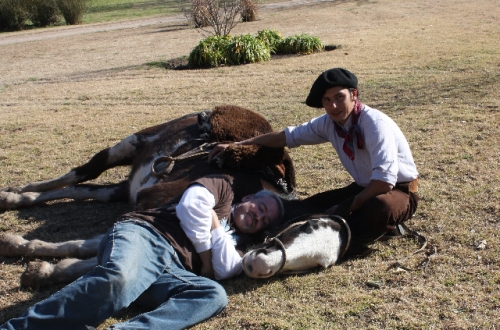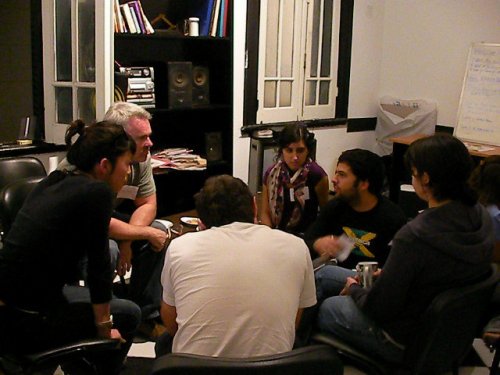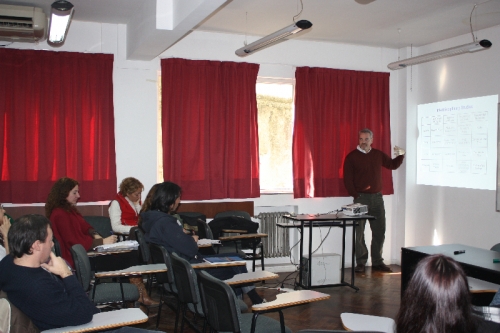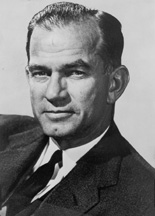Last week on Crazy People That Just Might Inspire You (CPTJMIY), we featured Crazy Person Dave Kovac on his involvement with Habitat for Humanity Global Village and how he manages to make his passion for travelling the world and helping people a regular part of his life. Hopefully, many of you were inspired (if not, let me know and I’ll tell Dave to try to be crazier in the future).
Dave’s success in setting his life up in a way that allows him to balance his passions with his commitments/responsibilities on an ongoing basis is pretty awesome. What’s perhaps even more awesome is that his is only one of thousands of ways to do this. If you spend most of your time in an office you likely don’t hear much about all of these less-conventional lifestyles that are out there–it’s not because they aren’t out there, it’s because the people that are living them are not spending much time hanging out in your office (also, conversely, the people that are in the office with you all the time are unlikely to be promoting unconventional lifestyles). That’s what CPTJMIY is here for.
Diversity is abundant when it comes to Crazy People. This week’s Crazy Person is Gordon Jack; he represents a whole different flavor of crazy.
Some background on Gordon
We met Gordon in Buenos Aires at an intercambio event at our Spanish school back in ~April. For those that aren’t familiar with the term ‘intercambio,’ in this context it’s meant to be a gathering of native Spanish speakers interested in learning English, with native English speakers interested in learning Spanish. You get together, drink some wine and talk half in English and half in Spanish. Perhaps the most notable part of our intercambio experience with Gordon was that there were no native Spanish speakers, so after making each others’ Spanish worse for awhile we just talked to Gordon in English. We’re glad we did.
We immediately hit it off with Gordon. Not only is he just a very cool guy; at the time, he was also relatively new to BA and from San Francisco so we had a lot to talk about. Also, he’s a Crazy Person. Gordon somehow managed to get the US government to pay for a ~6 month trip to Buenos Aires for him and his family; sadly, we did not. Intrigued? Would you like to get the US government to pay for an incredible international adventure for you? We thought so. Let’s find out how this works.
Gordon Jack: The interview
Let’s start with some basics…
Gordon, give us some background… what is your career back home?
I am a high school English teacher.
Why do you do it and how long have you been doing it?
Most teachers would say they want to save the world by educating young people to be caring and responsible citizens. That’s kinda true for me. Initially, I took the job because I wanted extended vacations. After working in advertising for four years, I needed more than a two-weeks off a year.
Have you done any long-term travel like this in the past? If so, where/why?
I’ve never enjoyed vacations that involve a lot of traveling. What I like to do is repeat my routine in a foreign country. That way, I experience both normalcy and abnormality at the same time. It makes the craziness comfortable (or the comfort crazy, I haven’t decided which.)
As a sophomore in high school, I lived for a summer with a family in Oaxaca, Mexico. My sophomore year in college I studied abroad in Lugano, Switzerland for a semester. After quitting my advertising job, I lived in Granada, Spain for two years. I also worked for a year in Santiago, Chile at the international school there. Given all this time spent in Spanish speaking countries, it’s surprising my Spanish isn’t better than it is.
What do you like about international travel/living? What motivates you to do it?
I like the challenge of international living. Every day, you learn something new about the culture or language. Back home, I wouldn’t spend much time finding the right medicine for constipation. But in another country, that can be a whole day adventure!
Do you consider yourself to be a Crazy Person? Do your friends and family?
I don’t think so, but those funny green men in orange suits who live in my sock drawer disagree with me.
Ok, now about this Argentina thing…
How long were you and your family in Argentina?
5 months
Why Argentina?
I spent a long weekend in Buenos Aires when I was working in Santiago, Chile and fell in love with the city. I love the beauty of the architecture, the life on the streets, the plethora of parks and museums. There are also incredible things to see outside the city, like the glaciers, waterfalls, vineyards, lakes, cattle ranches, and dinosaur fossils (OK, my seven year old son made me include that last one.)
We heard that you got the government to pay for a big chunk of this trip… How is this possible? What did you have to do for them in return? (We’re hoping it involves secret spy stuff)
Well, I sort of spied on their academic institutions, but I didn’t learn any valuable state secrets. I went to Argentina on a Fulbright scholarship, which paid for most of the trip. Most people, including myself, think that Fulbright grants are reserved for fancy academics but they have some for slobs like me too. In return for the money, I had create a project that promoted cross-cultural communication between students in Argentina and the United States.
Tell us more about your project
My project involved having U.S. And Argentine students engage in a visual correspondence of photographs to see what could be learned about a different culture. Over the course of three months, the students exchanged photographs which in some way represented their values or beliefs. The challenge was to find a way to represent an abstract idea with a concrete image (they weren’t allowed to put themselves in the photo). Upon receiving the photo, the partner had to interpret the image and then send one back that matched it in some way (through a similar use of line, image, color, etc.) but communicated something unique about him or her. Here is a link with some examples: http://www.slideshare.net/gordonjack/visual-correspondence-project
So what were the results of your project?
The results were mixed. Not as many students participated as I would have liked, but the students who participated did amazing work that made me look good to the fancy academics.
Would you consider your experience worthwhile?
Definitely. It was an amazing experience for my family. We got to spend a lot more time together, which you might think would be disastrous, but it worked out surprisingly well.
Let’s talk Fulbright…
How did you get the idea to apply for a Fulbright scholarship?
I wish I could say it was through months of painstaking research and thoughtful deliberation, but the truth is, I saw an ad in an educational magazine announcing a new Fulbright grant called “The Fulbright Distinguished Awards in Teaching” and decided to apply. When I asked my wife’s permission, she looked at me kind of funny. “I’m sorry,” she said, shaking her head. “I thought for a second you said you wanted to apply for a Fulbright Distinguished Award in Teaching.”
“I did,” I replied.
“Distinguished? Really?”
“Why not?”
“Nothing. Go for it.”
Little did she realize what a misnomer the program’s title was.
Can just anyone apply (age/expertise/education/etc.)? How do you qualify?
You need some teaching experience. Here’s the website for anyone who’s interested: http://www.fulbrightteacherexchange.org/dteIndex.cfm
What kinds of projects can you do? Any good examples of other projects you are familiar with?
Like I said, the goal of the projects is to promote cross-cultural understanding and dialogue. My project involved a visual correspondence of self-portrait photographs between Argentine and U.S. students. Another Fulbrighter in Argentina was studying traditional folkloric music to teach to her students in the U.S.
What percent of your time were you focused on your project vs. enjoying your trip?
The nice part of about the scholarship was that it allowed for a more balanced time of work and play. The bureaucracy in Argentina is pretty bad. As a result, things move much slower there than in the U.S. The nice part about this was that while I was waiting for my mentor to find me classes to teach and attend, I could go on nice long lunches with my wife.
If you get a scholarship, what does the government provide?
Money and contacts. We had to find our apartment and our son’s school on our own.
How does the application process work? How long does it take? How competitive is it?
I applied in March 2009, was accepted in May of that year and left in February 2010. I don’t know how many applications the Fulbright organization received. The program was new so I benefited from fewer people knowing about it.
Any advice for someone interested in applying?
Do it! It’s great. I was burning out and now I feel like I’m burning again (in a good way).
Any pros/cons to trying to get this kind of a scholarship to facilitate travel?
Well, there’s the whole work thing. That could be a pro or a con depending on your point of view. We could have traveled more if I didn’t have to work on my project. On the other hand, the project focused my time and made it feel more purposeful. I feel like I got more out of my experience because I had this particular focus that put me in touch with people I never would have met if I were just traveling.
Now, a little on balancing this with the rest of your life…
Did you have to quit your previous job in order to do this, or was your employer willing to let you go on sabbatical for awhile?
My employer reacted the same way as my wife when I told him I was applying for this grant. He had to sign a form guaranteeing my job when I returned, which I think he only did because he never thought I would get it.
Any advice for convincing an employer to let someone do something like this?
Play along with other people’s low expectations but don’t let them dissuade you. When you approach your superintendent with the form, say “This is something I’m never going to get, but would mind signing it anyway?” Then be sure to act all surprised when they accept you and apologize for any inconvenience this may cause. You should also mention that it looks good for the district to have a Fulbright teacher on their staff, even though no one probably cares.
Was it challenging to convince your family to go along? How did that work out?
My wife was surprisingly game for the adventure and my seven-year-old son wasn’t told about it until we boarded the plane so he didn’t have time to complain.
Any general advice for people looking to find ways to make their passions part of their regular lives?
Well, first you have to find your passion, which can be hard because sometimes it’s buried deep beneath the thousands of emails filling your inbox. Taking time away from your responsibilities can help you discover what you like to do. As a teacher, I benefit from having three months a year to do this and it’s helped me understand what makes me happy and what makes me miserable. Now, I’m trying to focus as much of my time on the happy part and avoid as much as possible the miserable part, which is also hard because no one pays you to be happy. They only pay you to be miserable.

Gordon getting paid by the government to happily take a nap with an Argentine horse (photo courtesy of Gordon)
Thanks Gordon!!
You can read more about Gordon and his family’s adventures in Argentina on his very entertaining blog: http://jackfamilyinba.wordpress.com/
For those of you that aren’t teachers, fear not, you still may be able to hook yourself up with a Fulbright Grant. They have several programs for people of different backgrounds. Check out the official site for more details on what grants are out there and how to get more information: Official Fulbright website If you manage to get one of these, not only does the government pay for an incredible adventure, but it’s super prestigious and according to the Fulbright Wikipedia page, lots of Fulbrighters win Nobel Prizes–those look really good on your resume.
So, to recap:
- Government pays for crazy travel adventure
- You design your own research project having to do with things that interest you
- You get a good balance between living/working in a foreign culture and an amazing long-term vacation
- It’s highly prestigious and will very likely help to advance your career rather than looking like a long vacation
- You might win a Nobel prize
Sounds like a pretty awesome way to take a career break to us. We wish our career break had at least one of these five elements (ideally either the government paying for it or the Nobel prize).



